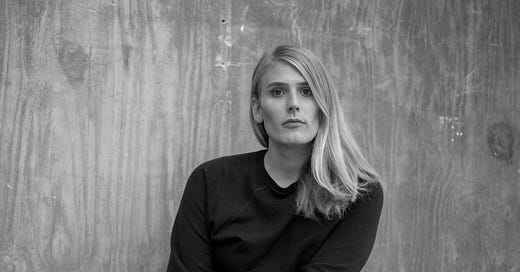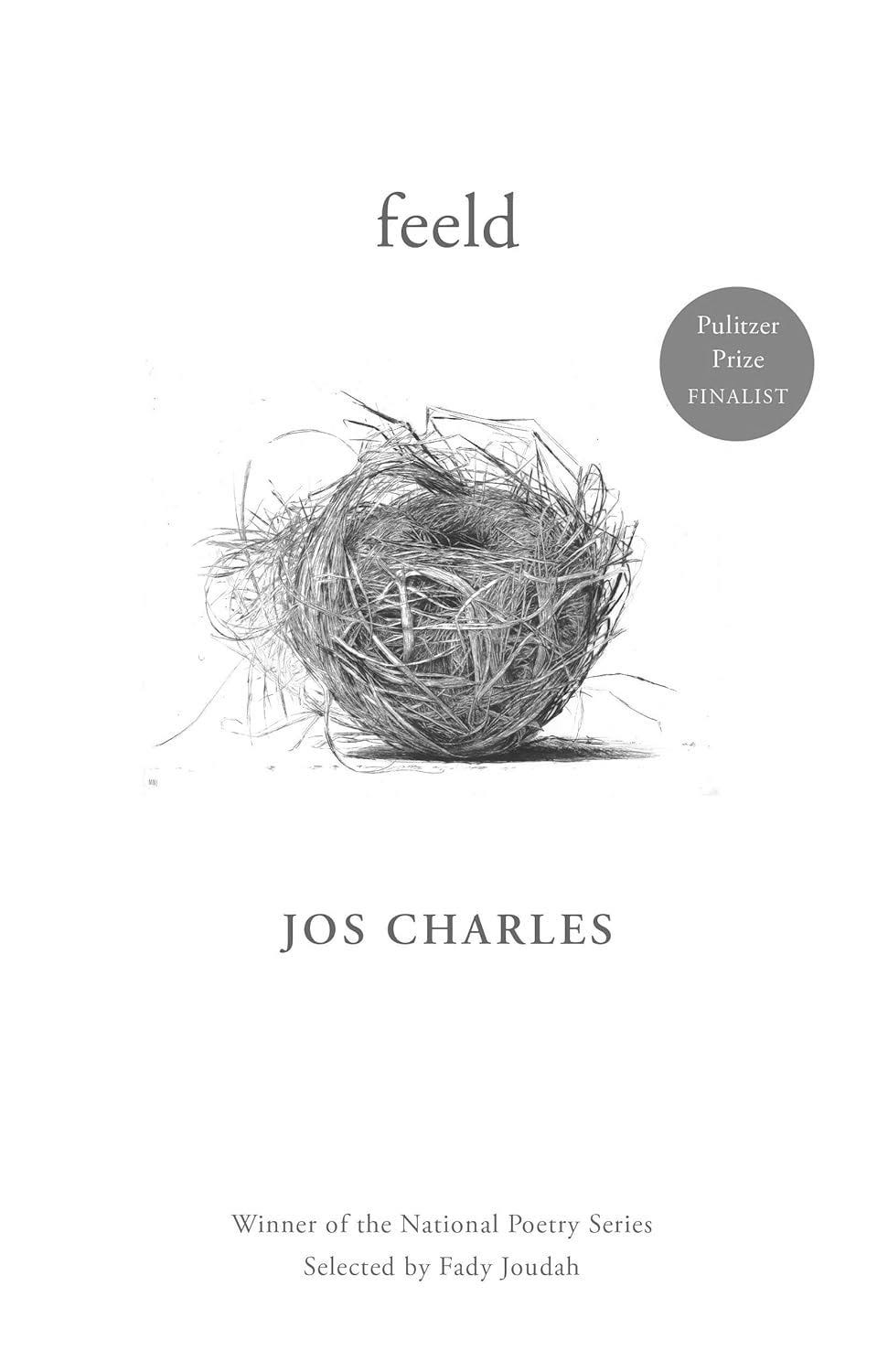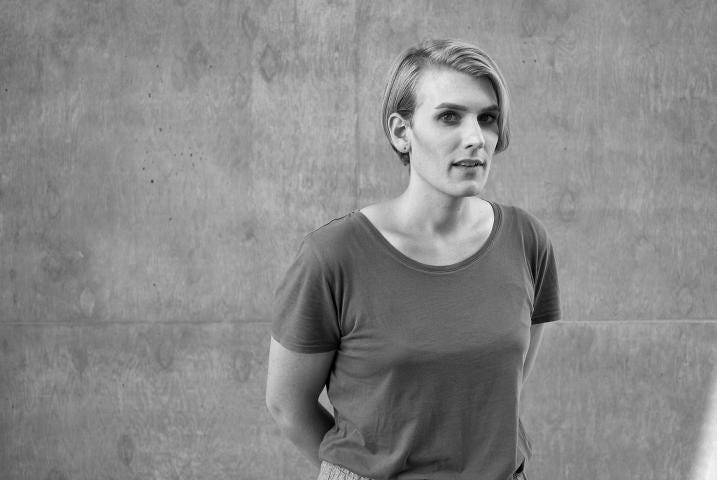Hello Gossips,
Hope y’all North American folx are weathering the heat dome ok (don’t frak around with this heat: stay hydrated; know where the nearest public swimming pools are; go to a mall where they have AC; check on older folks in your community: someone’s wife works on climate change and extreme heat) and everyone further flung is weathering all else the world is throwing at them. Today, we’re re-sharing our post on the inimitable Jos Charles. Because she’s awesome; because maybe you didn’t subscribe until after we posted this before; because some of us are working as carpenter-painters these June weeks and we didn’t totally get our pipeline of awesome new posts finished for y’all like we wanted. So: thanks for your understanding; stay cool; and do revel in Jos Charles’s wondrous poems.
Yours,
C+C Poem Factory
The first time I read Jos Charles’s book, Feeld, I was actually walking in a field. Ok: I’d started to read it at home, but then the dog needed a walk. So despite my mother’s admonition to never read while walking (some great uncle was said to have been hit by a horse carriage while reading the newspaper and walking in the street), I took Feeld with me to the field up behind the church. If you have one handy—a field, that is—I do encourage you to give Charles’s book a read in such a setting: the experience does something wonderful to your brain.
Jos Charles is a remarkable poet. She’s received her share of praise and recognition (Feeld was nominated for a Pulitzer and longlisted for the National Book Award after being published as part of the National Poetry Series), but we here at Holy Gossip feel like she’s still not read as much as she should be. Her books are real, real good.
Charles lives in Long Beach, CA, and is on the visiting faculty for UC Riverside Creative Writing Department and teaches in Randolph College's low-residency MFA program. She is also the founding-editor of THEM—a trans literary journal. In 2016, she received a Ruth Lilly & Dorothy Sargent Rosenberg Fellowship through the Poetry Foundation. Her first book, Safe Space, was published by Ahsahta Press in 2016, and she’s published two other books since: Feeld and a Year & other poems.
a Year & other poems, just released in paperback by Milkweed this year, is a luminous collection of finally-wrought poems with a tremendous sense of space and openness. Timothy Ott writes that “I remain deeply moved by how carefully and intentionally Charles selects and places each syllable on the page, and by how that care extends to us as readers.” Ilya Kaminsky says of the book that “Charles is a kind of poet whose writing teach us to pay attention to our language again, because attentiveness is the natural prayer of the soul.” In a review/essay in The Cleveland Review of Books (totally worth a read in its entirety), Bradley Trumpfelder writes: “At the point that it reaches toward an other, language has to open, by which I mean become vulnerable to, time. a Year & other poems is so staggering precisely because of how relentless Charles is in her commitment to reaching despite and because of, in equal measure, loss.” Grief and mourning are lines of energy through the book, but as Kevah Akbar notes: “Jos Charles writes of gratitude made wise by grief, grief made whole by joy.” In an interview with NPR, Charles reflects on the temporal mechanics of mourning: “it hurts to mourn,” Charles says. “ "It requires its own time and velocity that doesn't map onto 'year time' or 'month time' or 'clock time' or 'checking in and out of work time'." She discusses in the interview how even if absolute healing in the aftermath of grief or pain isn’t necessarily possible, "The very fact of that 'after' might be enough to keep going.” David Woo writes in Poetry that: “the poems here seek to strip language to its borderlines—between self and other, past and present, private and public—not to evanesce in abstraction but to hold the mind within contrarious states of being.”
Joss’s previous book, Feeld, is also a remarkable reading experience. Charles has written the book length sequence of poems in an English that, she says (in a very thoughtful meditation at the Chicago Humanities Festival on her poetic method and ethos), “inhabits what I was hoping would be a kind of speculative language with references, yes, to Middle English but also internet speak” as well as her own internal poetic idiosyncrasies. In part XXIV of the book, she writes: “bieng tran is a unique kinde off organe / i am speeching materialie / i am speeching abot hereditie.” The experience of reading poems with such unexpected and at times unsettling spellings is really profound, challenging, immersive, but, overall, utterly joyful. Taking the poems in creates a double process of lyrical sense-making inflected by the mind’s awareness of its own reaching and searching for constellations of possible meaning. Tracy K. Smith writes: “Language becomes a felt thing, a terrain to be crossed.” In his wonderful and wide-ranging interview with Charles in APR, Kevah Akbar writes: “When I started to read the poems in the new manuscript, I felt like the words were physically lifting up off my laptop screen toward my eyeballs. It was that rarest thing—a totally new sound, riffing on Donne and Chaucer, yes (Celan and Lispector also loom large), but still totally new, an unprecedented syntax to accommodate an unprecedented experience. Every poet gropes their way towards this kind of sui generis utterance, but so few of us achieve it so absolutely.”
Here are two poems of Charles’s poems as published in eoagh and poets.org respectively.
I INTERNALIZED UR MISOGYNY AND THEY CALL ME DYSPHORIC
i have never acted.
i have never acted except in solidarity with those who were the conditions for my acting.
male flesh: a fiction we can’t afford
and yet i swallow.
reading that motherfucker you love and sympathizing with the directive real of hate.
claudel, “what is the use of being a woman, unless to be gathered.”
watch me fill the wound
your fullness makes.A Poem
It is not normal, a woman says
Never has been, another said
Ordinary, the men women make
In parks, corners of street, rhyme Daily,
I shut the window I pass messages by
The so-called tender seed of birch blows quietly by
It will be crushed in the office of living
and still may take root So crush
what is given The tender too carry guns
Do not forgive the too forgivenWe hope you go out and track down copies of Charles’s books for yourself, and also keep an eye on what she’s up to on Insta. If you’ve read her poems, leave us a note below about what you have experienced in her work.








